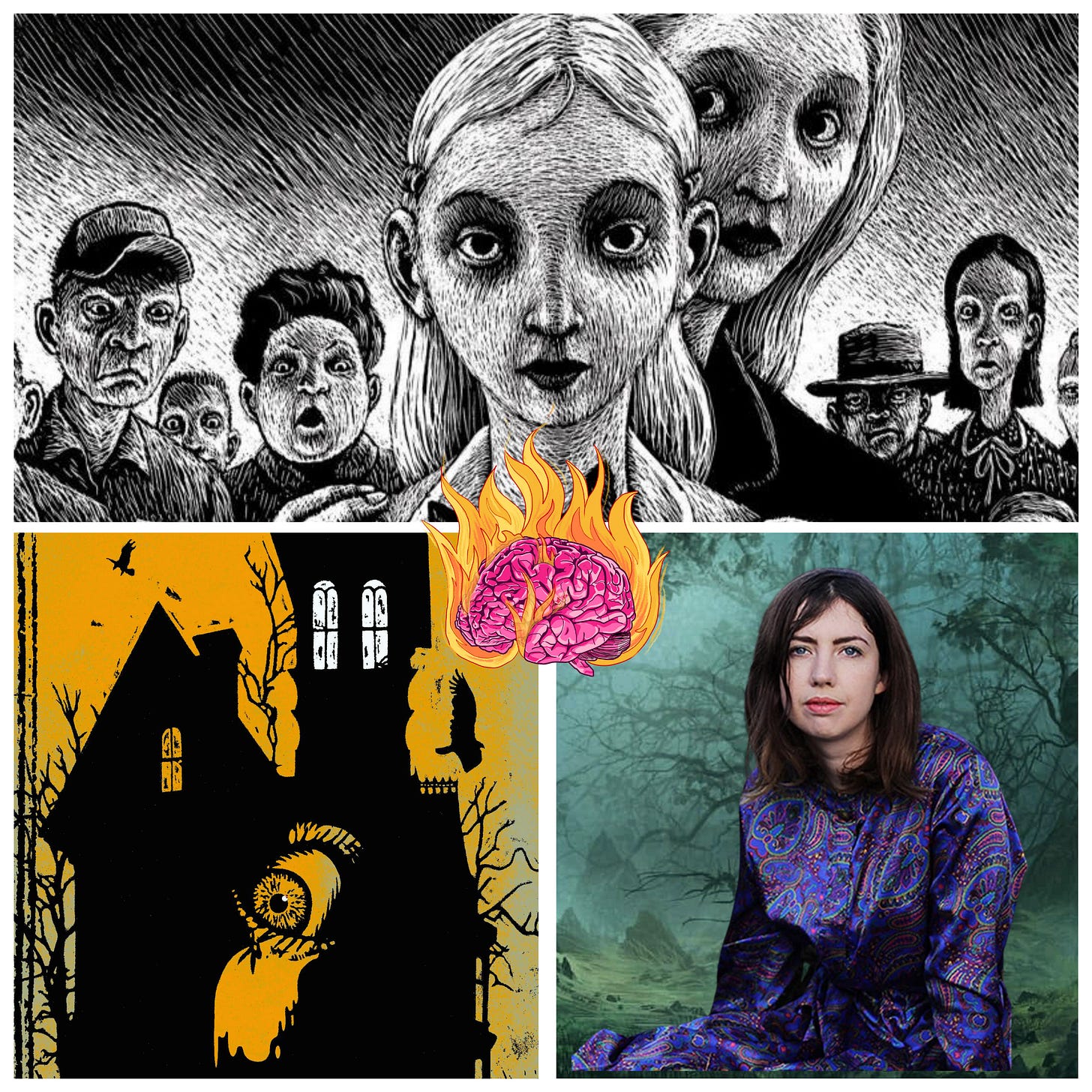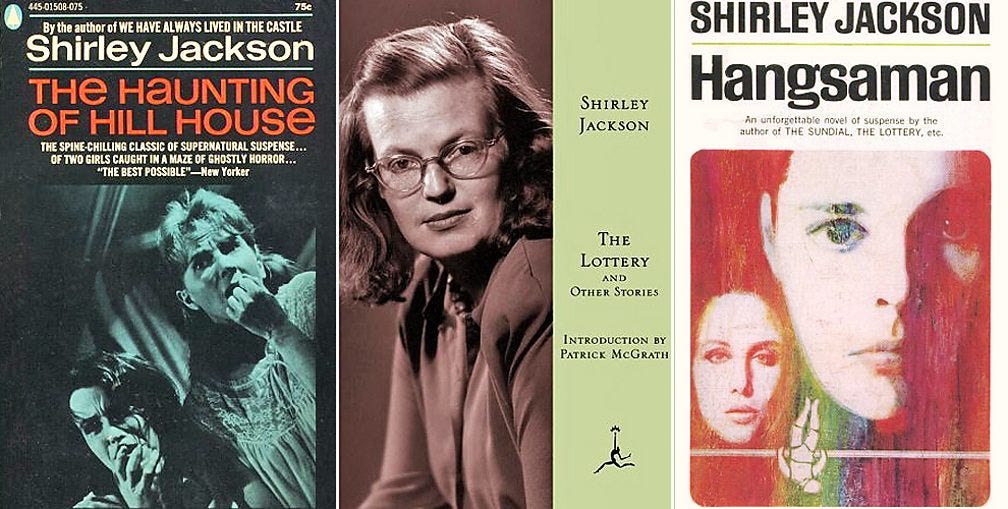OM: Hera Lindsay Bird is Obsessed with Shirley Jackson
"The people who were drawn to her... were the outcasts and weirdos. And she didn't like that very much."
Maybe you fell in love with Hera Lindsay Bird reading her weekly advice column for The Spinoff, where she responds to contemporary conundrums with sage truths like:“There’s something deeply addictive about marinating in the exquisite pain of loving someone you know you can’t have”, and - regarding the struggles of being alive at *a time like this* - “If we’re walking on the roof of hell, gazing at flowers, we might as well pick a few daisies on the way down.”
Or maybe it was that tweet. You know the one - fired off in 2017, after Metiria Turei admitted she’d lied to WINZ to put food on the table as a young mother, and was harangued about it so much she was essentially forced to resign. Hera’s response has been called The Perfect New Zealand Tweet, and it captured a side to our national psyche we’re less inclined to advertise…
I fell in love with Hera in 2016, at my first ever Litcrawl— a literary pubcrawl now folded in under the Verb Wellington umbrella, which sees frothing book nerds footslog venue to venue for an evening, soaking up readings and interviews with our literary best. I was unfamiliar with Hera’s work, but was immediately taken by the dark-haired, red-lipped poet proclaiming to a crowd of Left Bank pedestrians (as well as nearby Oriental Kingdom diners) that: “Keats is dead so fuck me from behind…”
I was both enraptured and horrified. You can’t say that! I thought, clutching pearls I never knew I was wearing. You can’t invoke a romantic great while being railed on all fours!!
But Hera did. She invoked Auden and Shelley and Wordsworth too. And Bill Manhire! A poet still living!! In the same milkloving piece of shit country she was now reading her poem aloud in! How DARING! (You can read the rest of that incredible poem here).
Keats is Dead… is from Hera’s debut poetry collection Hera Lindsay Bird, which won both the Jessie McKay Prize for Best First Book of Poetry at the 2017 Ockham Book Awards and the 2017 Sarah Broom Poetry Prize. The following year, Hera released her second poetry collection - the excellently titled Pamper Me To Hell & Back - which was selected by Carol Ann Duffy as part of the Laureate's Choice Collection. Hera is currently working as a school librarian while chipping away on a couple of books, including a children’s fantasy novel that’s “so close to done”… though it may be a while yet before we see it.
“ I'm like an old man taking apart a classic car in his garage,” she says, “I like the process of it. And so I think that maybe part of me is not willing to quite let it go yet.”
In this instalment of Obsessions Monthly:
Who is Shirley Jackson and what makes her so compelling? How did she use her personal pain and dark humour to craft a legacy that still resonates today? And was she really a witch?
👻 Hera Lindsay Bird is Obsessed with Shirley Jackson 🐦⬛
Shirley Jackson is a fascinating figure in American literature. Often called the 'American Queen of Gothic Horror,' Jackson was a prolific writer during the 1950s and '60s, producing a wide range of novels, short stories, and essays. But despite her literary success, many view Jackson as an object of pity: a paranoid housewife who died agoraphobic and addicted to methamphetamine, unhappily married to a man known to sleep with his students.
For Hera Lindsay Bird, this framing distorts both the context and the nuance of Jackson’s life and work, exaggerating the darker aspects while overlooking the profound strength, charisma, and freedom she exhibited throughout her career.
Take her later struggle with agoraphobia—this often overshadows the power she held within her own home. As Hera puts it:
‘She’s kind of a prisoner… but she’s the emperor too. It's one of the things that makes reading her work so good, because the powerless people are also the people who are pulling the strings.”
Over her two-decade career, Jackson wrote six novels, two memoirs and more than 200 short stories. Her story The Lottery, now one of the most famous and widely read of the 20th century, was first published in The New Yorker in 1948, causing hundreds of letters of outrage to flood into the magazine’s offices,* and her 1959 novel The Haunting of Hill House - now a popular Netflix show - is widely recognised as one of the best haunted house stories ever written.
A huge number of writers cite her as a major influence: from Stephen King to Richard Matheson, Ottessa Moshfegh to Joanne Harris. On the subject of Jackson’s canon, and the American gothic label it’s usually filed under, Harris has said: "Calling her work American gothic isn't a satisfactory description for what she does. American gothic is more about the big revelations, the climactic scenes. With Jackson, the strangeness is more trippy. She builds tension that never breaks. Reading her, you're left with a sort of thunderstorm headache."

Hera is similarly dissatisfied by the label.
“She gets lumped in with a category of writers that she doesn't really belong to… She writes these very funny, complicated, quite haunted, quite unnerving stories, often about houses and domesticity and the inner life, particularly the lives of girls and women.
There is a lot of psychological unease … But there's also so much beauty in the domestic, and lavish pleasure in the food, and so much about the wind through the grass—”
Hera pauses, unsure how to best express exactly what it is about Jackson that resonates so strongly with her.
“—I think maybe the best way to talk about why Shirley Jackson is so great is just to read the very opening paragraph of We Have Always Lived in The Castle,” she says, flipping open her own coverless, dog-eared copy, and beginning to read aloud:
“My name is Mary Katherine Blackwood. I am eighteen years old, and I live with my sister Constance. I have often thought that with any luck at all, I could have been born a werewolf, because the two middle fingers on both my hands are the same length, but I have had to be content with what I had. I dislike washing myself, and dogs, and noise. I like my sister Constance, and Richard Plantagenet, and Amanita phalloides, the death-cup mushroom. Everyone else in our family is dead.”
It’s been called one of the best opening paragraphs of all time (the beginning of The Haunting of Hill House also features on other best opening lists), and it certainly captured my attention.
Described on GoodReads as “a deliciously unsettling novel about a perverse, isolated, and possibly murderous family and the struggle that ensues when a cousin arrives at their estate”, We Have Always Lived in the Castle is both the first Shirley Jackson novel Hera ever read, and her lasting favourite.
“[Mary Katherine, or Merricat] has got such a good sense of humour. She’s a bit mentally immature… and goes off on these spiteful, malevolent tangents. I love a really good first person perspective story, and this is one of the best ones,” she says.
We Have Always Lived in the Castle is a great example of great power held by characters who appear to have none at all. The Haunting of Hill House is another.
“You read this book which in any other writer's hands would be an unhappy ending and in Shirley's… it’s transcendently beautiful and aspirational. It’s almost like the more psychologically unwell [her characters are], and the more restricted their living conditions, the greater the power they have.
It's a really interesting contradiction… and I think this is really mirrored in Shirley's life,” she explains.
Shirley Jackson was born in San Francisco, California, in 1916. Growing up, her relationship with her mother Geraldine was strained. Resentful over the fact that she’d fallen pregnant so soon after marriage, Geraldine became aggressively critical towards Shirley, especially about her weight.
“Shirley was always a bit of a disappointment to her,” says Hera.
As a teenager, Shirley wanted nothing more than to fit in. Her diaries of the time return to the subject repeatedly, and to her dismay over the “plain, spotty girls” she seemed to attract as friends.
"The people who were drawn to her... were the outcasts and weirdos. And she didn't like that very much. She wanted to be involved in something a bit more glamorous and attractive,” says Hera.
And so when, at Syracuse University in New York, the renowned and charismatic lecturer Stanley Hyman read one of Jackson’s stories in an undergraduate magazine and - without having met her - declared they would be married, Jackson must have felt she was finally being elevated to the status she deserved.
Soon after graduating, Hyman and Jackson were married, and Jackson stepped into the role of housewife—albeit somewhat reluctantly. They had four children together, whom she adored, but she struggled with the conflicts of being an artist as well as a wife and mother.
Jackson’s children describe her as constantly at work, hammering away on her typewriter in snatched hours while they were at school or after they were tucked into bed at night. But they still felt they got the best of her, as her eldest son Laurence said: "Shirley was a very loving and attentive mother, and I never felt she even remotely let the darkness of some of her writing affect her family life.”
Hyman and Jackson’s marriage was—if not unhappy, certainly complicated. They were deeply into each other, and Hyman was a passionate supporter of Jackson’s work, but they also drove each other crazy. He was neat, she was chaotic. Hyman didn’t believe in monogamy, and while Jackson reluctantly agreed to an open relationship—more out of social pressure within their avant-garde circle than genuine desire—his numerous affairs caused her deep emotional pain.
While Hyman was a loving and dedicated father, he contributed little to the practical demands of family life. This was captured in one of Jackson's drawings, where Hyman reclines on a chair while a pregnant Jackson carries in all the groceries. “Dear, you know the doctor said you weren’t to carry anything heavy,” he says, while making no effort to get up and help her.
By the time The Haunting of Hill House was published in 1959, Jackson was grappling with serious health issues. A heavy smoker whose asthma was exacerbated by her habit, she also suffered from joint pain, exhaustion, and frequent dizziness, leading to fainting spells. Like Merricat and Constance in We Have Always Lived in the Castle, Shirley felt increasingly isolated by the townspeople around her. Her lifelong anxiety escalated to the point where she stopped leaving the house altogether.
As Ruth Franklin’s 2016 biography A Rather Haunted Life notes, Shirley began taking a 'frightening array of prescription medications,' including Dexamyl—an amphetamine-barbiturate combination marketed as both a diet pill and antidepressant—along with Thorazine and Valium.
What with her various physical and mental health struggles, it’d be easy to draw the conclusion that—at least towards the end of her life—Jackson was more prisoner than emperor. But within the “restricted living conditions” of her home, Shirley wielded what power she had to great effect.
For example, when hurt by another of Stanley’s affairs, Jackson would respond by orchestrating elaborate, long-running pranks to destabilise him.
“She was the first gaslighter. She was terrible!” laughs Hera.
“When she was angry she would go into [Stanley’s] room and move all of his ashtrays by a quarter of an inch… [or] she would convince him that his favourite movie didn't exist… removing all references to it in their house and ripping all of the pages out of the magazines.”
Known for keeping a small army of black and grey cats, Shirley would secretly add more to the collection without telling Stanley. He could never quite figure out how many cats they had, as they all looked so alike.
So, too, did Jackson pull strings when it came her public image, crafting a larger-than-life mythology that must have caused more than a few biographers to tear their hair out. Rumours abounded that Jackson was a practicing witch, a fact she privately complained about in letters to her parents, while simultaneously feeding in interactions with the press.
She once claimed to be responsible for an associate’s accident, after creating a wax figure of him with a broken leg, and had a long-running joke about her attempts to hex the opponents of her favourite baseball team, the Brooklyn Dodgers.
The bio on the inside flap of the first edition of her debut novel read: “Shirley Jackson, we are reliably informed, is perhaps the only contemporary writer who is a practicing amateur witch, specialising in small-scale black magic and fortune telling with a tarot deck.”
“I think one of the great contradictions about her personality is that… she liked to be admired, but she's really looking for acceptance and love… and she didn't know how to be close to people,” says Hera.
In August 1965, it’s said that Hyman and the children returned from an outing to find Shirley motionless in bed. At first assuming it to be another one of her mean pranks, they soon realised she had passed away.
“It’s such a shame because… The stories that she wrote just before her death are her greatest works. She could have had such an amazing career ahead of her if she hadn't died so young,” says Hera.
Perhaps, having read this, you’re curious to read Shirley Jackson but unsure where to start.
Maybe you don’t often read classics, either because they seem difficult or irrelevant to modern life (or maybe, like me, you get overwhelmed by the sheer number of contemporary releases to get through, neglecting classics in the process).
Hera is the opposite: generally favouring older books over contemporary fiction.
“The problem with new books is that they haven't stood the test of time. That’s such a banal observation to make, but there is truth in the fact that… you get a better hit rate because things have survived for a reason, right?” she says.
Plus, what kind of escapism is on offer in a book that mirrors modern life?
“I don't want to read about someone in their mid-thirties having like a miserable working life! I don't want to hear about the horrible group chats they're a part of!.. I feel like that's the last thing I want to do when I go home from those same situations,” says Hera.
And while many older books do make for more arduous reading, that’s just not the case for Shirley Jackson.
“People think they're going to get Flannery O'Connor, who is great, but who is difficult. Shirley Jackson is not difficult. Shirley Jackson I give to 13 and 14 year old girls at work,” says Hera.
“If you’re nervous about reading her, just pick up a copy of We Have Always Lived in the Castle and honestly, it'll take you two days. You'll rip through it and you'll be like: ‘I don't know why I ever thought this was hard!’”
Thank you for reading this instalment of Obsessions Monthly, delivered in the nick of time for January (!!), thanks to a NY bout of covid and other summer distractions. This interview with Hera was originally recorded for an upcoming podcast about Obsessions… so keep an ear out for that.
A quick reminder also that I’ve 2 x double passes to give away to erotic thriller Babygirl! Paid subscribers can comment on the original post for immediate entry, or else like and comment on my instagram post.
See you soon!
x
*The Lottery also earned Jackson fan-mail, including one letter from a man whose name she half-recognised, saying how much he loved her work. As Hera tells it: “This was before the days of the internet where you can just Google... So wanting to be polite and thinking that probably he was some literary critic or that she'd met him at one of her colleges, she was like, “Oh, I really love your work too!”… Then later she went back and figured out that he was writing to her from a prison and he had committed some sort of horrible murder.”
** This article also talks about how some of Jackson’s later-in-life weight gain might be attributed to Hyman attempting to control her through behaviours that would now have him labelled a “feeder”—encouraging her to overeat as a means of keeping her dependant on him. “He would … urge food on her. Thick cream pies … I had to watch him stuffing her like a goose,” said her agent later.















